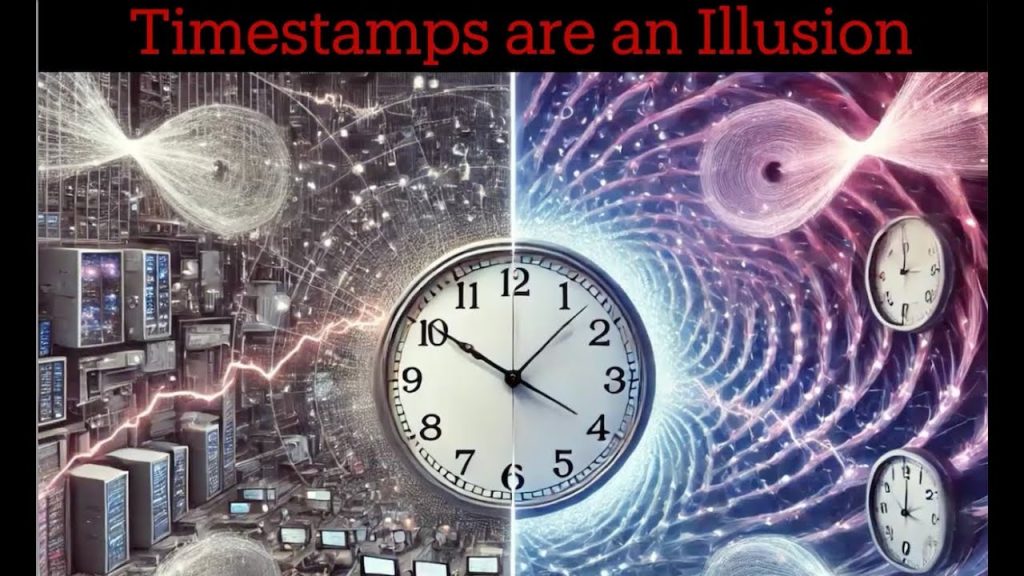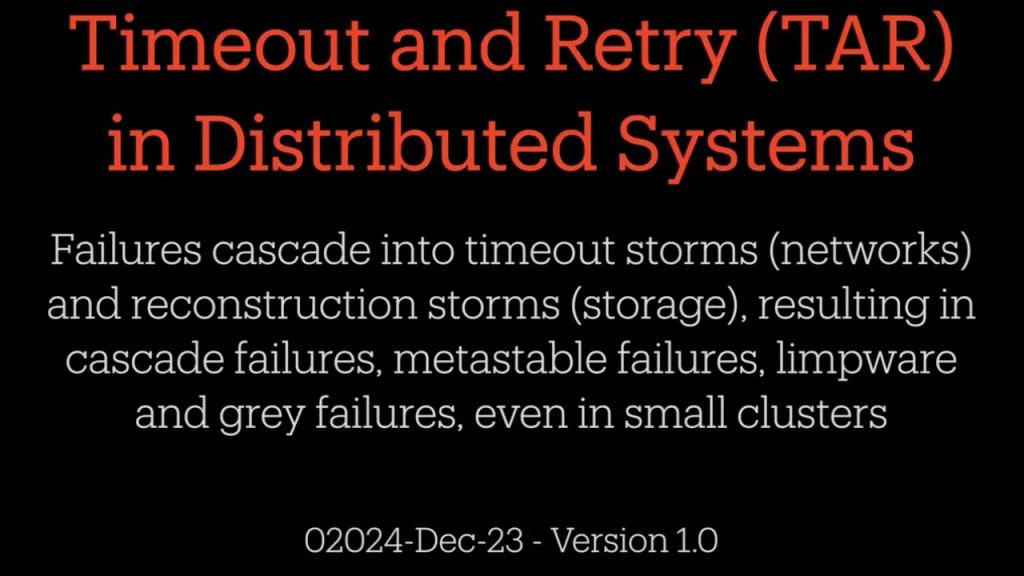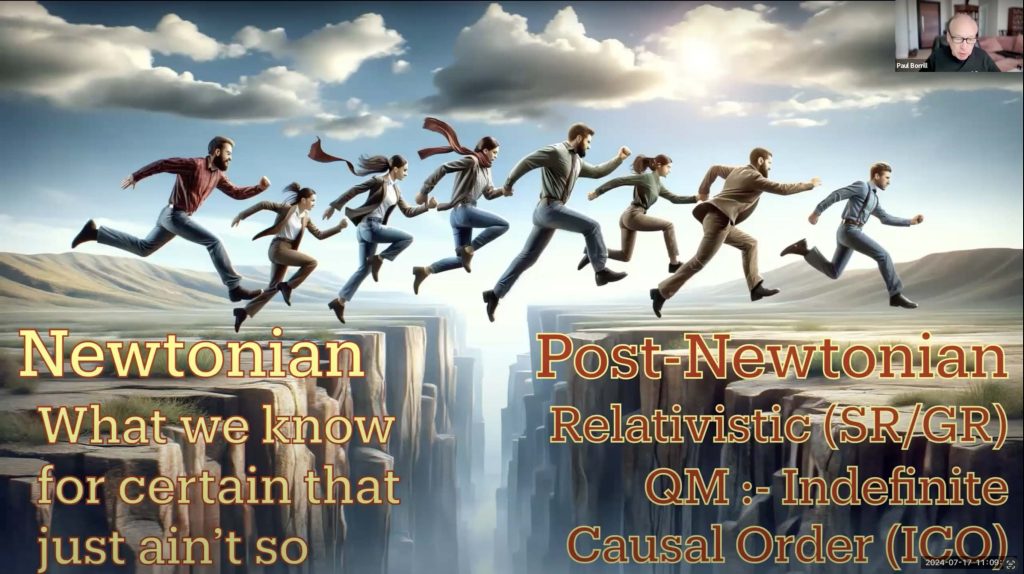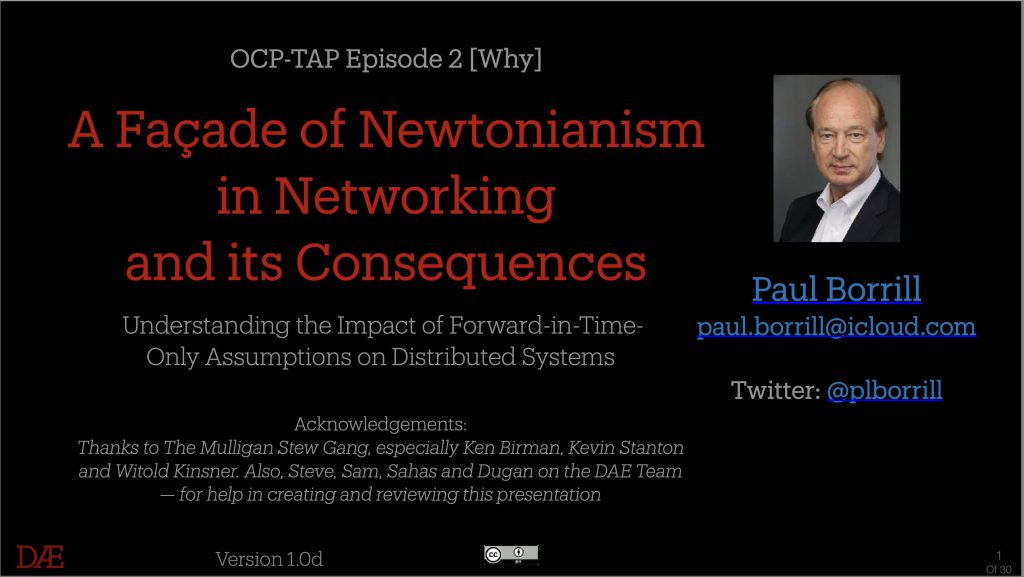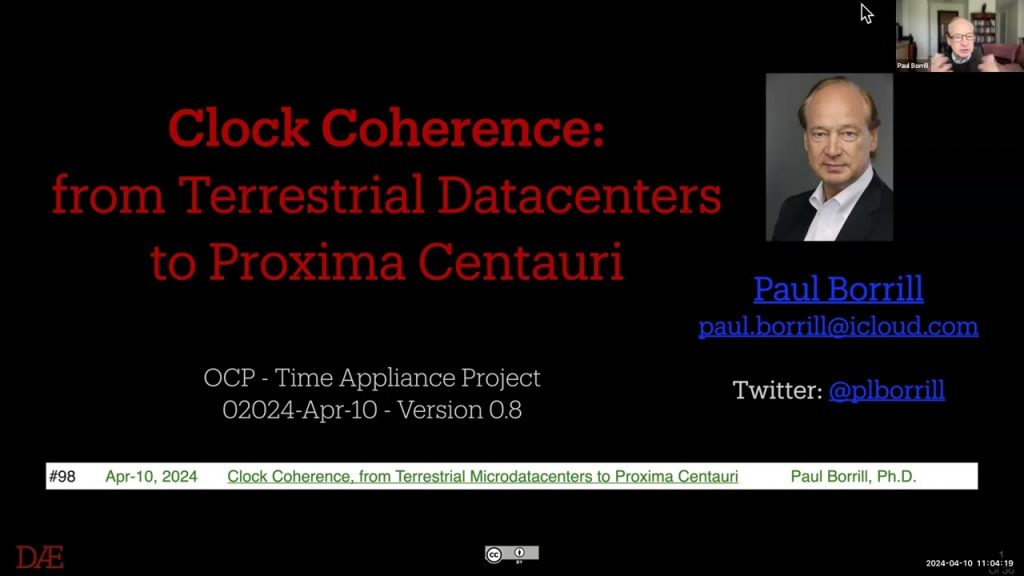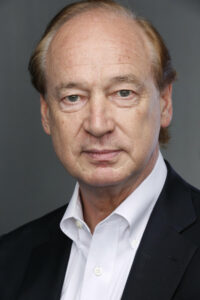It's About Time!
With Paul Borrill
A place to discuss our evolving knowledge of the nature of time and causality. For physicists, computer scientists, mathematicians, neuroscientists, philosophers, and practicing engineers.
Follow
Paul Borrill
on Twitter
Follow
IAT!
on Clubhouse
Follow
Paul Borrill
on Clubhouse
The Physical Impossibility of Distributed Systems:
A Systematic Deconstruction
Paul Borrill’s systematic deconstruction reveals that computer science has been built upon a façade of Newtonianism that modern physics has thoroughly demolished. The ACID properties, the foundation of reliable distributed systems, assume a universe that does not exist—one with absolute time, universal simultaneity, and observerindependent causality.
This does not mean distributed systems cannot function, but it does mean we must abandon the illusion that we can engineer our
way around fundamental physical constraints. Instead, we must design systems that acknowledge and work with the observerdependent,
probabilistic, and causally indefinite nature of reality itself.
The Time Appliances Project and similar efforts represent humanity’s attempt to impose Newtonian order on a quantum mechanical
universe. They succeed as engineering approximations but fail as fundamental solutions to the problems they purport to solve.
Recognition of this distinction may be the first step toward building distributed systems that work with physics rather than against it.
Alternating Causality: Reversible Information Flow and the Arrow of Time in Communication Channels
The explosive growth of one-way data flows in modern interconnects, now routinely in the 100 Gb–1 Tb range, shows no sign of slowing. Yet, while one-way throughput scales, two-way (acknowledged) communication remains fundamentally bounded by the round-trip speed-of-light latency.
This contradicts assumptions in many network architectures that model performance and congestion control only in terms of one-way6 delay.
A crucial shift emerges when Ethernet frame lengths exceed the physical length of the underlying link. In this regime, acknowledgments of each frame occur during transmission and incur almost no penalty, enabling a reconceptualization of classical Shannon theory. By reversing the time-oriented Turing tapes at both ends of the link and comparing sent and received bits with hardware comparators on the SERDES interfaces, one-way entropy analysis can be generalized into a two-way Shannon channel. This reframing directly integrates feedback into the definition of information itself.
The implications extend beyond communications engineering. At the conceptual level, this analysis resonates with well-known debates in the foundations of physics, especially the interplay of information, entropy, and time symmetry. We propose a new model of temporal structure, termed Alternating Causality, which formalizes time as a reversible bidirectional process, and information as a conserved quantity. Link to PrePrint or Download Alternating Causality PDF
Episode 5: Ethernet Spacetime
Timestamps are an Illusion. They can’t be fixed in software. The quest for a single, consistent timeline across distributed systems collides with the reality that physics itself does not provide a universal notion of time—and in many quantum scenarios, there isn’t even a consistent causal order at all. Though timestamps will remain indispensable in engineering practice, we must recognize them as approximations rather than absolutes, and design our systems accordingly. Time synchronization is not merely a technical challenge—it’s a conceptual one. Software Fixes Are Only Band-Aids, they can never be deterministic. In this presentation, we also announce the birth of Ethernet 2025.
THERE IS NO GLOBAL DRUM BEAT. In Episodes 1 through 4 we expressed doubts about the common belief system of a Newtonian view of the world in this community. We showed how to think about race conditions, and why Timeouts and Retries (TAR) are the root of all evil. Our conclusion is that Timestamps are an Illusion. They can’t be fixed by software.
The quest for a single, consistent timeline across distributed systems collides with the reality that physics itself does not provide a universal notion of time—and in quantum mechanics (the machine code of our universe), there is no consistent causal order at all. We cannot, therefore, rely on this illusion of an irreversible drumbeat on an inaccessible “real line” to provide linear time order for events in our networked systems.
Although timestamps will remain indispensable in engineering practice, we must recognize them as approximations rather than absolutes, and design our systems accordingly.
Episode 4: Timeout and Retry (TAR) in Distributed Systems
In Episode 1 (What) and Episode 2 (Why) we showed how misunderstandings accumulate within a Newtonian framework of time, and how this leads to lost transactions and corrupted data. In this Episode we help the audience make the leap from Newtonian Time (what we know for certain that just ain’t so) to Post-Newtonian Time (relativistic SR/GR, and Indefinite Causal Order (ICO). Now PTP is widely available, we propose experiments to falsify beliefs about the Newtonian Time. We will then show how to utilize the excellent engineering behind PTP and PTM, from a different perspective: using the clock hierarchy to build causal trees with reliable failover, to help address race conditions and achieve Exactly Once Semantics.
[EPISODE 4 – Why we can’t have nice things in Distributed Systems.]
• Instants are meaningless, only intervals (on the same computer/timeline) are relevant
• Photons don’t carry timestamps, but timestamps are carried by photons
• The speed of light is the pivot around which time and space evolve
• Timeout and retry (TAR) on different timelines will silently corrupt data structures
• Shannon entropy is a logarithm. The logarithm of zero (no information) is minus infinity.
• Bayesian approaches require a prior belief, which can be unbounded (zero to infinity). Actually, it’s much worse: can be ¥,1,0,+0,+1,+¥ We can’t do Bayesian statistics under those conditions, mathematically, their results are undefined
• Shannon Entropy is uncertainty, and the same problem applies when you apply the set: ¥,1,0,+0,+1,+¥ to Information and Entropy p log(p)
• Measurements appear instantaneous because there is no background of time
on which to measure anything. Timestamps don’t provide causal order.
Episode 3: Race Conditions and Exactly Once Semantics in Distributed Systems
How a Static PTP Hierarchy can be made Dynamic to support Causal Failover for Distributed System
In Episode 1 (What) and Episode 2 (Why) we showed how misunderstandings accumulate within a Newtonian framework of time, and how this leads to lost transactions and corrupted data. In this Episode we help the audience make the leap from Newtonian Time (what we know for certain that just ain’t so) to Post-Newtonian Time (relativistic SR/GR, and Indefinite Causal Order (ICO). Now PTP is widely available, we propose experiments to falsify beliefs about the Newtonian Time. We will then show how to utilize the excellent engineering behind PTP and PTM, from a different perspective: using the clock hierarchy to build causal trees with reliable failover, to help address race conditions and achieve Exactly Once Semantics.
[EPISODE 3 — How a static PTP hierarchy can be made dynamic to support causal failover for distributed systems]. In Episode 1(What & Episode 2 (Why) we showed how misunderstandings accumulate within a Newtonian framework of time, and how this leads to lost transactions and corrupted data. In this Episode we help the audience make the leap from Newtonian Time (what we know for certain that just ain’t so) to Post-Newtonian Time (relativistic SR/GR, and QM — Indefinite Causal Order (ICO).
• PTP is widely available in Datacenters, we propose experiments to falsify beliefs about Newtonian Time.
• All is not lost. The excellent engineering behind PTP and PTM, can still be used with a different perspective, by using the clock hierarchy to build Causal Trees and reliable failover, to help address race conditions and achieve Exactly Once Semantics
Episode 2: (Why) A Facade of Newtonianism in Networking
• Clocks can be disseminated, but require interaction to be synchronized
• Simultaneity planes don’t exist (except in an empty frozen universe) Einstein proved this over 100 years ago Why do we still think we can synchronize clocks?
• Network Time Protocol (NTP) and Precision Time Protocol (PTP) are causal TREES — choose your root, and how you do failover
• Entanglement and indefinite causal order are the new relativity (Not restricted to low relative velocities or atomic scales)
• We cannot assume spacetime is irreversible and monotonic
• Irreversibility and monotonicity is in the Eye of the Observer A hidden assumption of Newtonian time pervades all of computer science and networking. We make believe that an “inertial frame” allows us to ignore relativity, and that quantum effects are too small to matter.
A hidden assumption of Newtonian time pervades all of computer science and networking. We make believe that an “inertial frame” allows
us to ignore relativity, and that quantum effects are too small to matter.
Nothing could be further from the truth. In this session we will explain why this matters: Inconsistent partial orders among different observers (e.g. logs in distributed databases), cause silently lost and corrupted data structures. We connect the dots between the hidden assumptions (smooth, monotonic irreversible), and the evidence/consequences seen in recent work on Partial Network Partitioning (PNP).
In Episode 1 (April 10) we showed [what] happens when we try to synchronize clocks. In this session (Episode 2 – Jun-05) we explore the [Why] it matters, and the consequences. In Episode 3 (July 17 – “Race conditions and Exactly Once Semantics in Distributed Systems”) we explore the [How] ways to address this indefinite causal order problem using Causal Networks based on PTM.
[EPISODE 2 – Hidden assumptions about causality lead to lost & corrupted data]. When we think about clocks as an incrementing number, we are committing the FITO fallacy – “Forward In-Time-Only” Thinking:
• Counterfactuals, i.e., “events that could have occurred but eventually did not, play a unique role in quantum mechanics in that they exert causal effects despite their non-occurrence”
• Clock Synchronization Error is indistinguishable from Latency
• Irreversibility (Monotonicity) is an illusion not guaranteed by physics, unless we build Ancilla to explicitly manipulate causality
• Irreversibility and “causal order” are IN THE EYE OF THE OBSERVER—not guaranteed to be consistent across different observers
Episode 1: (What) Clock Coherence From Terrestrial Microdatacenters to Proxima Centauri
Alternating Causality: Reversible Information Flow and the Arrow of Time in Communication Channels
Clock synchronization, as we know in this forum, is a hard problem. This talk is motivated by a project Robert G Kennedy III, who revealed a plan to send a swarm of nano-spacecraftt to Alpha Centauri and return pictures. [Asilomar Microcomputer Workshop, April 24-26, 2023]. Knowing techniques for distributed clock synchronization is apparently critical to the success of the project he asked us to describe the problems of clock synchronization and illuminate a potential solution based on his work in Distributed Systems in Terrestrial datacenters.
There is no now. You cannot synchronize clocks the way you think. Talk originally given at the 2023 Asilomar Microcomputer Workshop, presented live with Jonathan Gorard.
Motivation: (1) to get people thinking about the nature of time and causality, as far removed from the Earth (and TAI/GPS) as possible. (2) to stimulate “First Principles Thinking” for Distributed systems. See The Last Theory Newsletter on What is the causal graph in Wolfram Physics
Spacetime is Doomed
A relationship with time is intrinsic to everything we do within and between our networked computers. An assumption that time is a smooth, irreversible, global Newtonian/Minkowskian background is a common but rarely questioned belief in computer science; yet, physicists now know this model to be incorrect. Our guest speakers are all people who have thought deeply about the nature of time. We collectively realize that a new understanding could potentially revolutionize the way we approach physics, computer science, chemistry, neuroscience, and many other subjects.
Its About Time is Alive and Well
On July 1st 2023, we moved the group discussions to a more focused private weekly meeting we call Mulligan Stew on Zoom at 7am (Pacific Time) on Fridays, participants include (in addition to mathematicians and physicists), experts in the Database/ Distributed computing community. We continue to explore the nature of time and causality in physics & computer science, and how this connects to the reliability of transactions in datacenters of all varieties and scales.
If you would like to learn more about what’s in the future for ItsAboutTime.club, and, Mulligan Stew, please follow @plborrill on twitter and DM us there to be invited to Mulligan Stew.
If you would like to learn more about our company, and the breakthroughs we are making in distributed computing, please visit https://daedaelus.com
Previous Its About Time Episodes
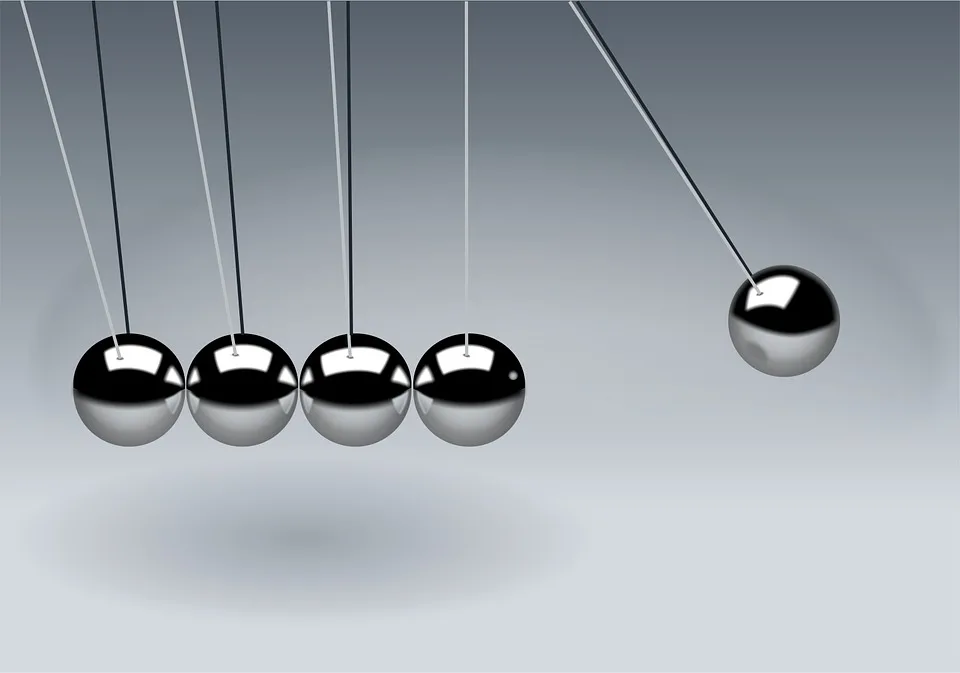
20-May-23
Challenges with Modern Cosmology & Implications for Time (Did the big bang happen?)
Björn Ekeberg
New observations from the James Webb Space Telescope and scientific challenges to dark matter put the standard model of cosmology in crisis. How deep do the problems go and how does it affect time?
Recent Episodes
29-Apr-23
Compositional Causality-
Jonathan Gorard
Notions of causality invoked in quantum information theory, relativity, distributed systems, etc. seem incompatible, and fraught with philosophical difficulties. Can ideas from category theory help?
22-Apr-23
Bell’s Theorem and Retrocausality-
Ken Wharton
Combined with quantum entanglement experiments, Bell's Theorem has long proved that we can't have nice things when it comes to space, time, and causality. But it is now becoming widely appreciated that we can still demand locally-mediated influences if we are willing to allow for hidden retrocausality. This talk will describe the various motivations for developing retrocausal models of quantum phenomena, detail some promising models already in the literature, and summarize their prospects for restoring a spacetime-based reality to fundamental physics.
01-Apr-23
Reducing Jitter in Cloud Databases-
Pat Helland
Gray failures in clouds cause delays in responses to requests. Can we build fast transactional DBs if ENOUGH servers answer quickly while others are slow? What does time mean for transactions?
25-Mar-23
Computational Complexity Theory and Thermodynamic Resource Costs-
David Wolpert
Resource costs in Computational complexity depend on the size of the input. We summarize recent results of its relationship to heat, and research issues at the intersection of stochastic thermodynamics and computer science theory.
18-Mar-23
Information, Entropy, and Digital computation-
Edward A. Lee
Edward A. Lee discusses why digital physics may be an untestable scientific hypothesis that leads to much more difficult engineering models of the world than the ones we are familiar with
11-Mar-23
From von Neumann's rejection of Hilbert space to quantum for kids-
Bob Coecke
Bob Coecke discusses the shift in conceptual underpinnings that have happened since when John von Neumann wanted an alternative quantum formalism to recent developments, which include unification with causality.
4-Mar-23
Using Quantum Technologies to play with Quantum Foundations-
Jonte Hance
Jonte discusses two areas of quantum foundations ---interaction-free measurement and (statistical independence-violating) extensions of QM---to show how quantum technologies can be used to probe these.
18-Feb-23
Computing Needs Time-
Edward A. Lee
Time in concurrent and distributed software systems is distinctly non-Newtonian and notoriously difficult to reason about. A central challenge is to give system designers an abstraction that they find intuitive while still being able to deliver efficient implementations. One approach is to introduce a logical notion of time, distinct from physical time, that behaves in Newtonian way. This approach exposes some limitations, specifically a fundamental tradeoff between achieving agreement across a distributed system and the time it takes to determine what has been agreed upon. This tradeoff between Consistency (agreement) and Availability (time to access the agreement) gets worse as network Latencies increase, a result called the CAL theorem. A basic goal is to give designers the tools they need to work with this tradeoff.
11-Feb-23
Timekeeping in the 21st century – What are atomic clocks and how can we make use of them?-
Anne Curtis
Dr. Curtis delves into the experimental realities of atomic clocks and explore applications taking them beyond their clock-based origins: navigation, sensing, and testing General Relativity and physics beyond the Standard Model.
4-Feb-23
Quantum Uncertainty and Empirical Completeness -
Johannes Fankhauser
Johannes will discuss whether quantum uncertainty is fundamental or if alternative theories could have predictive advantage. The problem connects to locality and reconciles us to quantum features as aspects of limits on Nature's predictability.
28-Jan-23
Time Travel Paradoxes and Entangled Timelines-
Barak Shoshany
Dr. Shoshany discusses the idea that if time travel is possible, then parallel timelines must also be possible in order to resolve the resulting paradoxes.
21-Jan-23
Causality and the Arrow of Time in the Quantum World-
Giulia Rubino
Giulia explains how applying key quantum features such as superposition and entanglement to time flow and causal relations bears implications in fundamental physics and benefits for quantum computing.
14-Jan-23
Time Symmetry in Quantum Theory: A story with twists and turns-
Lucien Hardy
The story of time symmetry versus time asymmetry in Quantum Theory has undergone various twists and turns. Schroedinger's equation is time symmetric but quantum collapses introduce time asymmetry. Then Aharonov and co-workers found a way to restore time asymmetry for pure state Quantum Theory. However, this was undermined by the Pavia group who showed that causality (the inability to influence the past) reintroduces time asymmetry in the more general case of mixed state Quantum Theory. More recently (in my own work and that of others) it has been seen how to recover time symmetry in Quantum Theory. Is this the end of the story? Is having time symmetry important for the development of a theory of Quantum Gravity?
7-Jan-23
The Reality of Time Flow (Local Becoming in Modern Physics)-
Ric Arthur
Our naïve human senses can feel like there is an asymmetry in time when there is not. Here Bryan describes what is needed to have a true arrow of time, in the sense that 'time itself' has an asymmetry.
17-Dec-22-
Reversible Computing and Digital Technology Trends-
Michael Frank
Mike Frank will talk about the future of digital computing and the need for reversible computing technology, and speculate about why reversible computation may someday be key to saving the universe.”
10-Dec-22-
Misfiring Arrows of Time-
Bryan Roberts
Our naïve human senses can feel like there is an asymmetry in time when there is not. Here Bryan describes what is needed to have a true arrow of time, in the sense that 'time itself' has an asymmetry.
3-Dec-22-
Fusions of Consciousness-
Donald Hoffman
Donald explores a dynamical theory of conscious agents beyond spacetime, and its projection via decorated permutations onto spacetime.
26-Nov-22-
Entanglement, Spacetime, and Quantum Gravity-
Mark Van Raamsdonk
Mark talks about the holographic approach to quantum gravity, the emergence of spacetime from quantum entanglement, and what this might teach us about the real world.
19-Nov-22-
Quantum steampunk: Thermodynamics meets quantum information-
Nicole Yunger Halpern
Victorian thermodynamics crystallized the notion of entropy, which quantum information science has extended. Fusing these modern and antiquated sciences, quantum thermodynamics is real-life steampunk.
12-Nov-22-
Physics in 9 lines - Results and Remarkable Consequences with Suggestions for the Teaching of Physics-
Christoph Schiller
400 years of modern physics are summarized in 9 short lines - 5 principles and 4 sets of choices - that contain general relativity, quantum theory and the standard model of particle physics.
What People Say
Meet Your Host
Paul Borrill is the founder and CEO of Daedaelus Corporation and is a leading industry expert on the foundations of resilient network and storage infrastructures. Paul has served on: Apple’s Infrastructure team. VP/CTO for VERITAS Software. VP/Chief Architect for Storage Systems at Quantum Corporation. Distinguished Engineer, Director of Architecture & Performance, and Chief Scientist for IR at Sun Microsystems.
Paul was educated In Physics at the University of Manchester, has a Ph.D. in Physics from University College London, and is a graduate of the Stanford Executive Program.
“Many of the most intractable mysteries in cosmology, physics, and biology have to do with our insufficient understanding of time and its irreversibility in the face of the apparent symmetry of the laws of nature. A deeper understanding of time and related mysteries of entropy and causality may unlock new horizons in many disciplines at once. IAT is a weekly conversation where scientists, philosophers, and engineers meet to advance our understanding of time.”
